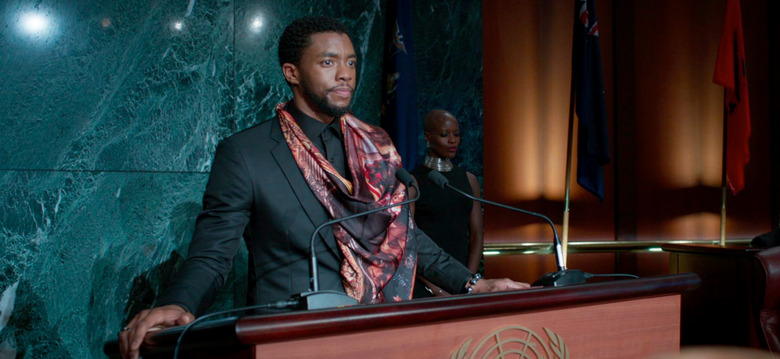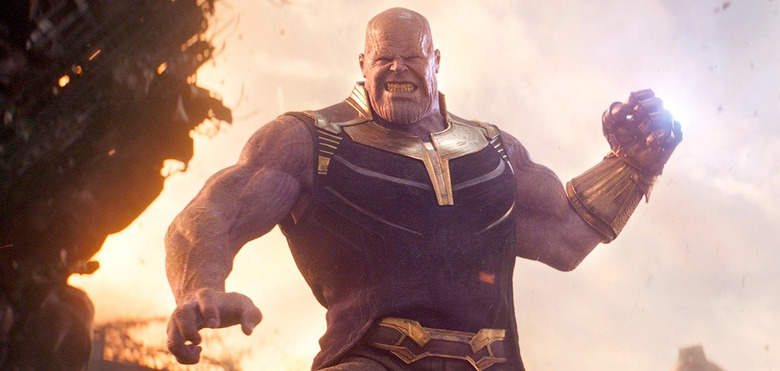Where Does Marvel Studios Go After 'Black Panther'?
Black Panther is Marvel's greatest achievement. It's my type of superhero film; one that's deep, impactful, and still super cool and fun to watch with a bowl of popcorn. With its historical, social, and racial importance, Black Panther stands apart from other Marvel movies as an example of how reality can affect the comic book film world. Plus, it's also one of the biggest financial successes the MCU has seen and it's not slowing down
But after Black Panther, what now? The film has reached a level Marvel hadn't seen before. How can the studio get lightning to strike twice? Most importantly, how can they keep shaky MCU fans like me from wondering if Marvel can reach similar storytelling depths again with future films? Will Black Panther be the only one of its kind?
From my viewpoint, Marvel's level of success is directly in tandem to how much the studio is willing to critique its superheroes. In other words, the more human a superhero acts, the more successful a Marvel film is likely to be. Black Panther exemplified that by not showing T'Challa as the Black Panther for large chunks of the movie; much of our time with T'Challa is when he's just a man learning to be more compassionate and open-minded to the world around him. The film's willingness to sit with hard themes and human emotions made it an outlier in the MCU.
Marvel can certainly repeat this formula again with their films post Avengers: Infinity War –that is, if they realize how beneficial such a formula can be.
Marvel’s push-and-pull with realism
One of the defining traits of Black Panther is just how much the story delves in regular, real world issues, far away from the fantastical fights of The Avengers and the space-operatic weirdness of Guardians of the Galaxy. Yes, there are high-tech gadgets and suits, journeys to the spirit world, and the mystical powers of the heart-shaped herb, but all of that is ornamentation on what is essentially a story about a family broken apart by circumstance. The true heroism comes from facing your own mistakes and failures, just as T'Challa had to come face-to-face with the pain and separation Killmonger embodied.
The battles aren't intergalactic, but interpersonal, with characters fighting to understand each other and emotionally regain something that was lost. That relatability is part of what endeared audiences to this film. Somehow, it successfully blended the Marvel style with an intimate story about family as well as a meditation on the experiences of the black diaspora.
To be fair, Marvel's claim to fame has never been one of journalistic investigation under the guise of superhero films. The franchise's goal has always been to showcase live action versions of their comic books, which means a focus on escapist entertainment rather than satire or allegory. But once a comic book goes from print to screen, more expectations get tacked onto it, mainly the expectation of there being some amount of substance that keeps the audience (especially those who aren't knee-deep in comic book lore) engaged.
Marvel has been largely successful in making most of their audience happy – nods to nostalgic periods like the '70s and '80s and an increased focus on comedy have made its latter films like the Guardians of the Galaxy franchise and Thor: Ragnarok some of the most defining films of Marvel's reign. Also, every film has some version of eye-candy, whether it's the special effects, inventive set design, costume design, or the actors themselves. But all of that eye-candy and frou-frou eventually can't hide the fact that too often, Marvel films can sometimes be too interested in being cool and less interested in telling a story that successfully combines substance with style. The superheroes themselves hardly ever have the chance to face down their own human failings, and when they do, it's only for fleeting moments instead of as full-scale emotional growth.
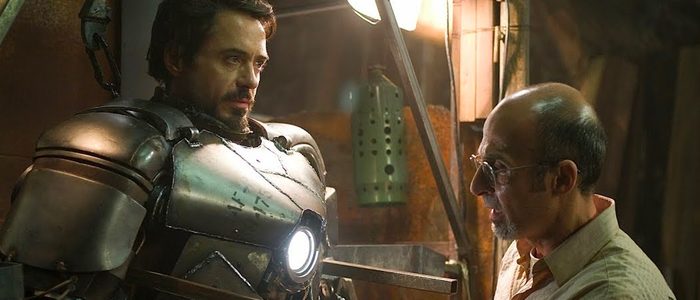
Take for instance the very first Iron Man, in which Tony Stark's ascent from oblivious money-hungry villainy to (still money-hungry) superhero. The backdrop for Stark's evolution is the Afghanistan War, a war he's steadily profiting from as an arms dealer. But the full extent of the war and America's involvement act as set dressing and Stark's financial relationship with the war is never fully investigated. He doesn't change his mind because of direct confrontation the way T'Challa was forced to with Killmonger. Stark's catalyst for change came when he was near death, and the one person he did have a close encounter with, Yinsen, was quite nice considering everything that's happened to him is because of a war partly funded by Stark. Stark has a few moments of mental pause, but overall, we're told to focus more on how cool and devil-may-care Stark is, whether he's near death in a cave or taking pictures with a soldier in a Humvee.
"When [Stark] poses for a photo with a soldier, he says, 'I don't want to see this on your Myspace page.' The scene is deeply 2008. Ultimately, Iron Man wants us to understand that Tony Stark is cool. Then the Humvee blows up. Stark is wounded by one of his own missiles – a redefinition of 'friendly fire' – and an origin story begins," wrote The Ringer's Sean Fennessey. "In 2008, the United States really was at war in Afghanistan, entrenched in an unwinnable struggle with an invisible army. It is a grave, unresolved chapter in our country's history. In Iron Man, it's an inciting incident for an expanding universe, a place setting for a Happy Meal."
Much of the MCU has been involved in setting the stage for the ultra-fantastical Infinity War, which combines the terrestrial Avengers (and otherworldly member Thor) with the intergalactic Guardians. The goal has been quite clear early on in the MCU's tenure, and sometimes, the films have suffered for it. With so much focus on the end goal, some films become more like the middle acts of a play rather than its own contained story, meaning much of the heart gets taken out as a result.
For instance, Ant-Man is supposed to be Scott Lang's origin story, but instead, it comes off as a staid look back at all of Marvel's worst tropes – the rich villain with no reason for their actions, the too-cool-for-school white male protagonist, the boring love interest, and goofy non-white sidekicks that do more harm to POC audiences than good. It also doesn't dive deep into the only point of pathos in the film; Scott's inability to provide a stable home life for his family, resulting in him being unable to see his young daughter. This is serious business, something that should have been much more of a driving force for the film's plot. But too often, that very real storyline of loss never gets fleshed out beyond being just yet another trope to drive the main character towards his ultimate realization of superheroism.
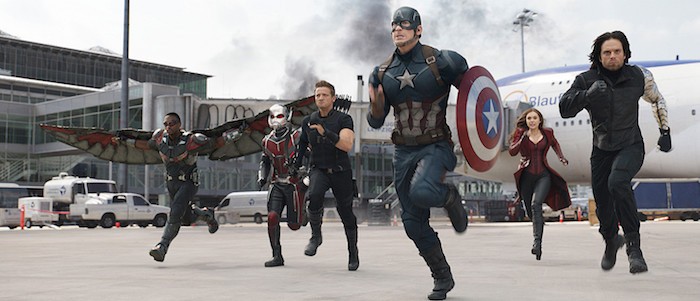
The devastation the Avengers cause has also gone unrecognized until much later in the MCU's tenure. The abject horror the Avengers wreak upon the world, not to mention their hometown of New York City, largely went uninvestigated until Captain America: Civil War. This film proved to be a turning point for the MCU, once again featuring Stark as the pivot point from the rockem-sockem "dumb jock" humor that defined the first half of the MCU to the more sober, adult, reflective side of the MCU, that truly recognizes Stan Lee's most popular phrase, "With great power comes great responsibility."
Thankfully, this realization is at its height during Civil War, the closest the MCU ever gets to fully reckoning with the Avengers' unchecked power. Stark is brought face-to-face with the mother of an innocent American expat who went to Sokovia to do charity work. To Stark's horror, he finds out that he and his fellow Avengers inadvertently killed him during the fight with Ultron. The news sends Stark down a path that puts him at odds with Captain America and several other members of the Avengers team, and eventually what was first a policy debate about government oversight for the Avengers turns personal when Stark realizes Steve Rogers himself knew who killed Stark's parents: the Winter Soldier under HYDRA's mind control.
Still, the human cost of the Avengers' lack of foresight is once again set aside when the true story behind Stark's parents' deaths comes into the picture. Instead, it becomes all about the visual spectacle of Stark and Captain America fighting each other and, of course, the big battle involving all of the Avengers fighting their comrades-in-arms.
All of these films are entertaining and fun. They are all successes in the sense that they are part of a project to create a universe of shared films, a task never before undertaken by a studio before Marvel and has since never been as successfully duplicated by rival studios. But they've also had the problem of sometimes being just a little too unrelatable, just a little too much like popcorn entertainment. There aren't real consequences, and there aren't real ends to characters' unresolved inner work.
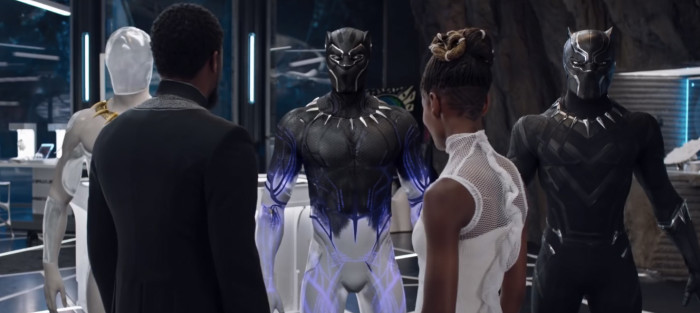
Marvel finally fixed its Achilles' heel with Black Panther. Finally, a film in the MCU has successfully melded superhero derring-do and real world questions in a way that's just as dazzling as the prerequisite boss battle at the end of each Marvel film. As I wrote in my Black Panther spoiler review, the film has real weight in how it tackles heady, tactile issues such as colonialism, the lasting effects of slavery, arguments for and against isolationism, and the painful process of learning compassion for others. Amazingly, all of this is merged into a film that fulfills the role of an MCU origin story. On many levels, Black Panther is a masterpiece and, indeed, a crown jewel for Marvel, but when it comes to meaningful storytelling in particular, the film is especially powerful.
The question Marvel has to ask itself is how can it repeat the type of achievements Black Panther did? Once you reach a new height, how can you match it? Even more challenging – how can you exceed it?
Marvel’s future after Infinity War
It's risky to discuss a film before it's even come out, but I will say that I'm worried about Infinity War. What worries me is just how much the film seems to be relying on Marvel's tried-and-tested techniques of presenting a less-than-fully-realized villain to act as a catalyst for full-scale melees that are great for special effects and 3D animation teams, but poor for audience members who actually want story integrated into the fights. To be blunt, the film seems like a standard Marvel film in all the ways Black Panther was not.
To be fair, Infinity War was being filmed during the production of Black Panther, so there was no way of knowing how well Black Panther would be received or how it would reveal all of Marvel's storytelling holes. But now that we have seen Black Panther, it's now very startling to see how different it is from the standard Marvel fare.
Yes, there is a lot at stake in Infinity War – the entire world and the universe could fall into the hands of Thanos – but we already know he won't win. There are no mysteries as to what will happen, which leave us only left with what we know will happen – tons of battles that excite and titillate, but probably nothing that will leave us mesmerized, contemplative, and inward-looking. Nothing like Black Panther.
To be fair, we should also be asking if it's even Infinity War's role to ask the tough questions. In all honesty, a film with a huge purple being swinging moons at people probably isn't the best film to look to for a deep investigation into the self. But another way to pose the question is this: How come we don't expect our superhero movies to teach us something about the world at large?
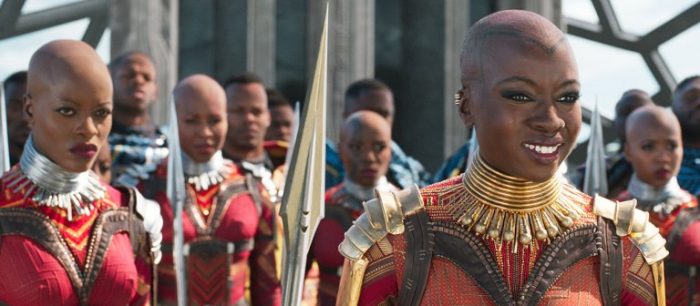
Despite what people want to believe about comic books, the genre is often a medium for creators to tell stories about their life experiences and their vision for a better, more just world. Comic book stories have engaged in issues like civil rights, women's rights, LGBTQ rights, and other types of social justice fights. Why do we not expect these issues to bleed into comic book movies? Why is Black Panther the sole Marvel film to actively explore this side of comic book storytelling? To that end, are we to expect Marvel to revert back to blockbuster-style action once Infinity War is over and their second grand arc begins?
Marvel's Kevin Feige told Entertainment Weekly that the movies after Infinity War "will be changed." I'm guessing that means the manner of storytelling will be changed because, of course, there will be the aftermath of Infinity War to death with (like major character deaths), and hopefully, a more mature outlook as a consequence.
Maturity is definitely something Marvel has been exploring in its latest films. There seems to be a realization that Marvel films don't have to stick within the standard "white guy saves everyone" story. Marvel films can appeal to everyone and can say much more than what they have in the past. Marvel films can have meaning within and outside of the comic book fandom sphere. As Black Panther has shown, a Marvel film can facilitate healing and even create change.
Maturity doesn't mean Marvel has to become less fun-loving; even Black Panther has humorous moments. But I think maturity is the biggest lesson Marvel can learn from Black Panther. The studio doesn't have to be afraid of being grown up and talking about real world issues. Under the right writer and creative team, a Marvel film can successfully merge the real and the fantastic together to create an amazing moviegoing experience, something that sticks with you much longer than a CG battle ever could. Hopefully, Marvel takes this lesson into its next arc.
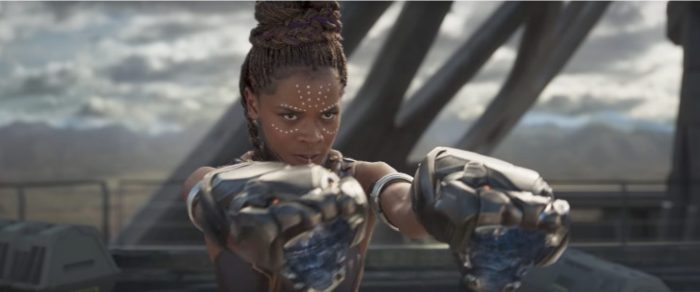
What I'd love to see from Marvel are films that explore what it is that makes these characters human. In Black Panther, we saw how T'Challa's superhero arc didn't revolve around him learning about his powers, but instead, it revolved around him growing his capacity for compassion. If that's not a human struggle, I don't know what is. But what's amazing is how the film posits this very normal struggle as something that deserves superheroic treatment. It shows that heroism doesn't just mean someone is imbued with godlike powers; heroism also means committing yourself to being a good person who is brave enough to do what's right.
During this first arc, we've seen the studio grow from thinking heroism came from super-cool gadgets, experimentations, and godliness. As the films have progressed, we've seen other, more introspective themes develop. At this point in the MCU, even the idea of the hero is being questioned as the MCU's stable of characters begin to second-guess themselves and rethink how they define themselves. I think Marvel's confident enough now to tackle the very concept of heroism and take viewers into existential, philosophical battles rather than visually explosive ones. As Vox's Todd VanDerWerff wrote, "The very idea of a superhero, someone whose very being is just better than everybody else, carries certain fascistic overtones...The best superhero stories, consequently, are aware of this troubling undertone and either examine it or deconstruct it in interesting ways."
As Marvel has shown, there's more to being a superhero than just being better than others. To be a hero – as Stark and T'Challa can tell us – you have to atone and understand the other side. You have to make amends and try to be better. In other words, you have to be conscious of your humanity. The path forward for Marvel is to show more superheroes struggling to be better people, because how can you be great at being super without a proper foundation? If Marvel gives us heroes who wear their humanity on their sleeves, we might get more fantastic films that can stand alongside Black Panther.

